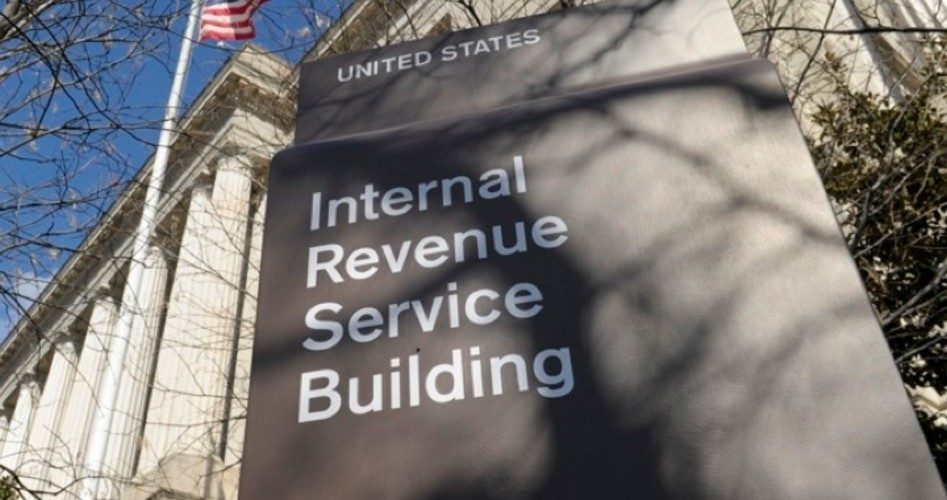
While Americans have gradually come to realize that the Internal Revenue Service was used as a partisan tool to attack the Tea Party movement over two election cycles, it is increasingly clear this scandal may become the biggest of the three scandals that rocked the Obama administration last week.
The IRS scandal involved the Tax Exempt and Government Entities Division of the IRS openly targeting Tea Party and other conservative groups applying for tax-exempt 501(c)4 “social welfare” organization status between 2010 and 2012 for extra audits and agency scrutiny. The result was a focus of IRS audits — which can cost tens of thousands of dollars and hundreds of employee hours to targeted organizations — upon the political Right, as well as delays of two years or longer in approving the tax-exempt status. Liberal groups were not selected for nearly as many audits, nor were they singled out by ideological code words, as conservatives had been.
And the Obama administration both promoted and granted more than $100,000 in bonuses to Sarah Hall Ingram, the administrator of the IRS division that implemented the politically-discriminatory policies. Ingram is now in charge of IRS enforcement of ObamaCare.
Treasury Inspector General for Tax Administration J. Russell George told the U.S. House Ways and Means Committee May 17 that his audit concluded:
• “The IRS used inappropriate criteria that identified for review Tea Party and other organizations applying for tax-exempt status based upon their names or policy positions instead of indications of potential political campaign intervention. Because of ineffective management by IRS officials: 1) inappropriate criteria were developed and stayed in place for a total of more than 18 months, 2) there were substantial delays in processing certain applications, and 3) unnecessary information requests were issued to the organizations.”
• “The IRS developed and began using criteria to identify tax-exempt applications for review by a team of specialists that inappropriately identified specific groups applying for tax-exempt status based on their names or policy positions, instead of developing criteria based on tax-exempt laws and Treasury Regulations. The criteria evolved during 2010.”
• “In early Calendar Year 2010, according to an IRS Determinations Unit specialist, the IRS began searching for applications with “Tea Party,” “Patriots,” or “9/12” in the organization’s name as well as other “political-sounding” names.”
• “As of December 17, 2012, many organizations had not received an approval or denial letter for more than two years after they submitted their applications. Some cases have been open during two election cycles (2010 and 2012).”
Inspector-General George told Congress that the IRS had asked illegal questions of the target Tea Party organizations in the process of the audits, “including requests for donor information, position on issues, and whether officers have run for public office.” According to one published news report, the IRS even asked for the organization to report the content of their prayers.
Inspector-General George also told Congress his audit had not found any information that IRS employees had received direct instructions from senior Obama administration officials to single out the Tea Party movement for audits. “We asked the Acting Commissioner, Tax Exempt and Government Entities Division; the Director, EO; and Determinations Unit personnel if the criteria were influenced by any individual or organization outside the IRS. All of these officials stated that the criteria were not influenced by any individual or organization outside the IRS. Instead, the Determinations Unit developed and implemented inappropriate criteria due to insufficient oversight provided by management and other human capital challenges.” And the inspector-general’s comment coincides with statements by Obama officials, who have essentially claimed to be Mr. Magoo on the issue.
White House Press spokesman Jay Carney told the press May 15 that “there was no knowledge here.” President Obama reiterated the same position in a press statement the following day: “I can assure you that I certainly did not know anything about the IG report before the IG report had been leaked through the press.”
But it’s not clear that using the IRS as a political cudgel against the Tea Party movement was entirely the idea of the IRS itself. House Ways and Means Committee Chairman Dave Camp (R-Mich.) noted in remarks before the May 17 committee hearings that there had been a pattern of IRS ideological abuses against political conservatives:
It would be a mistake to treat this as just one scandal. This may be the one generating headlines, but in total I count at least five serious violations of the taxpayers’ right to be treated fairly, honestly and impartially by their government.
First, back in August of 2010, a “White House official” discussed the tax status of a private company — a clear intimidation tactic.
Second, in June 2010, the targeting of conservative groups began.
Third, in May 2011, the IRS started to threaten donors to conservative leaning non-profits that they were liable for certain taxes.
Fourth, in March of 2012, the Huffington Post published the confidential 2008 donor list of the National Organization for Marriage, a conservative tax-exempt organization.
And fifth — but unlikely the final transgression — ProPublica announced that the IRS had leaked confidential applications for tax-exempt status from conservative groups.
Perhaps not surprisingly, various news sources have reported that top Treasury Department officials were informed of the investigation at least as early as June 4, 2012. Treasury Secretary Jack Lew acknowledged that he was informed of the Treasury Department inspector-general’s investigation back in March 2013 on Bloomberg television, and that his predecessor Timothy Geithner was likely informed the previous year: “In mid-March, I had had a conversation, just a getting-to-know-you conversation, with the inspector general right after I started, and he went through a number of items that were matters they were working on. And the topic of a project on the 501(c)3 issue was one of the things he briefed me was ongoing,” Lew said in an interview on Bloomberg. Of course, Lew is still denying he was briefed on any specifics, or that he knew the investigation involved politically motivated corruption. “I was not aware of any details,” Lew told Bloomberg. “I was aware of the fact of the matter being subject to a review. That’s very different from the substance of the findings.”
Meanwhile, administration officials continue with denials of reality. Acting IRS Commissioner Steven T. Miller astonishingly contradicted Inspector-General George before the U.S. House Ways and Means Committee “I do not believe that partisanship motivated the people who engaged in the practices described in the Treasury Inspector-General’s Report. I’ve reviewed the Treasury Inspector-General’s report, and I believe it’s conclusions are consistent with that. I think that what happened here was that foolish mistakes were made by people who were trying to be more efficient in their workload selection.”
Interestingly, Miller has fallen on his political sword for the Obama administration, and will resign next month as a result of the scandal. But what can be said of Stevens’ statement that targeting the political right was a “more efficient” workload selection? Essentially, he argued that conservatives are a native criminal class in America, a view that is ironically shared by Julian Bond, chairman emeritus of the NAACP. Bond told MSNBC May 14 that the government should engage in political discrimination: “No, I don’t think it’s a double-standard at all. I think it’s entirely legitimate to look at the Tea Party. I mean, here are a group of people who are admittedly racist, who are overtly political, who have tried as best they can to harm President Obama in every way they can…. They are the Taliban wing of American politics and we all ought to be a little worried about them.”
Top Obama administration officials are circling the wagons for what is likely a hopeless defense of Sarah Hall Ingram, who supervised the non-profit section of the IRS during the entire length of the scandal and was promoted last year to the IRS’ enforcement division related to ObamaCare. “No one has suggested that she did anything wrong yet,” White House senior adviser Dan Pfeiffer told Fox News Sunday May 19. Pfeiffer said pretty much the same to each of the other Sunday morning talk shows.
Even Treasury Secretary Jack Lew has leaped to Sarah Hall Ingram’s defense, telling Bloomberg May 17 of Ingram’s management of the IRS non-profit division: “I have heard that … she was not in a position of responsibility over these actions.” But Lew’s statement was patently false. Ingram was appointed as commissioner of the Tax Exempt and Government Entities Division on April 24, 2009, at the beginning of the Tea Party wave, and held the position until 2012, when the extra Tea Party scrutiny allegedly ended. Moreover, Ingram received some $103,390 in bonuses for her work on the IRS non-profit division during the time period of the discriminatory practices. Sarah Hall Ingram’s new job within the IRS is to enforce ObamaCare — aka the Affordable Health Care Act of 2010, the legislative centerpiece of the Obama administration — and as of this writing there are no plans to dismiss her from her current position.
Kentucky Senator Rand Paul noted in a May 16 op-ed for CNN that the IRS scandal strikes at the foundation of the U.S. government’s fairness and due process rules. “Protecting citizens’ right to speak out against their government has always been an integral part of what separates us from tyrannical regimes. What the IRS did is how the KGB used to target dissidents. It is how they deal with troublemakers in China…. Imagine if the IRS had targeted liberal or progressive groups under the Bush administration. The First Amendment cannot be renegotiated depending on which party holds power.” Senator Paul has called for a U.S. Senate investigation into the IRS scandal, which has thus far been blocked by the Senate’s Democratic majority.
The IRS scandal is a clear misuse of the executive branch of the president, and if it can be determined that the president knew that the IRS was engaged in a pattern of discrimination against conservative and Tea Party organizations and did nothing to stop it, it ultimately won’t matter whether he issued a direct order for the discrimination to commence. In that sense, the IRS scandal may be a political crime that is impeachable in a way the Benghazi and AP wiretapping scandals could never be. It also puts to lie President Obama’s preachy commencement address to Ohio State University May 5, where he urged graduates to cast aside any skepticism of big government:
Unfortunately, you’ve grown up hearing voices that incessantly warn of government as nothing more than some separate, sinister entity that’s at the root of all our problems; some of these same voices also doing their best to gum up the works. They’ll warn that tyranny is always lurking just around the corner. You should reject these voices. Because what they suggest is that our brave and creative and unique experiment in self-rule is somehow just a sham with which we can’t be trusted.
In reality, the Obama administration has (at the very least) allowed the kind of federal government that beats up on conservative organizations for no other reason than the fact that they want limited government envisioned by America’s founders. At worst, Obama was talking about his own administration, its liberal friends, and its forced implementation of ObamaCare when he mentioned in the same speech “the well-connected who … whisper in government’s ear for special treatment that you don’t get. That’s how a small minority of lawmakers get cover to defeat something the vast majority of their constituents want.”
Constitutionalists will have to resort to fighting the Obama administration’s dirty tricks and attacks on the Tea Party by working harder, in essence by following Obama’s advice to engage in “dedicated, and informed, and engaged citizenship. And that citizenship is a harder, higher road to take, but it leads to a better place. It’s how we built this country.” It’s also the only way the U.S. government can recover from an IRS scandal that has rocked the nation to its foundation.
Photo: AP Images



